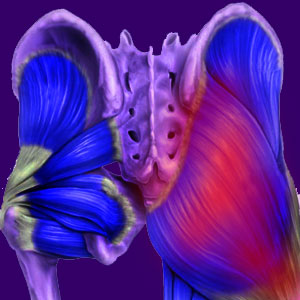
Much has been written about clenching the buttocks from an exercise point of view, but this habit can lead to pain and is a definite indicator of mindbody tension. People might clench their buttocks while standing, walking, sitting or in virtually any position. Most people are not aware that they are clenching, nor do they know the possible negative consequences of continuous tightening of the gluteal muscles.
As avid students of mindbody pain syndromes, we have come to analyze the physical characteristics demonstrated by some many patients who suffer from these insidious conditions. One of the most common of all posture and ambulation attributes is certainly butt clenching. We see this act as yet another of several possible physical manifestations of psychoemotional tension that is part of the underlying mechanism of transference from the mind to the body, eventually helping to produce pain.
This essay focuses on the anatomical causes and consequences of buttocks clenching. We will also provide deep insight as to why people clench from a mindbody perspective and how this potentially damaging habit can be stopped safely and effectively.
Anatomy of Clenching the Buttocks
Statistically, most clenchers are guilty of the habit almost continuously while standing still. About 75% also clench when walking. Only half of habitual clenchers will perform the action when sitting. Smaller numbers of clenchers might not realize they are also clenching the buttocks when reclining or in other common positions.
The action of clenching consists of tightening up the gluteal (gluteus maximus, gluteus medius, gluteus minimus) muscles, as well as some of the interior muscles deeper inside the buttocks anatomy, including the piriformis muscle. The anal sphincter is commonly tightened. Many patients also clench some of the upper leg and hip muscles as well, including the biceps femoris and quadriceps muscles.
The extent of clenching ranges from minor and barely perceivable to palpable both internally and externally. However, it must be made clear that when discussing this type of clenching, the activity is not being used consciously as a form of exercise or to provide additional support for some physical activity. Instead, we are detailing unconscious clenching that occurs without forethought or conscious execution of the action.
Why Are You Clenching Your Butt?
Many physical therapists, chiropractors and sports medicine physicians have commented on the reasons why people clench their buttocks. Some of the common theories implicate pelvic misalignments, lumbar instability, poor upper postural muscle tone, muscular imbalances, leg length differentials and excessively pronated feet. We have heard all of these explanations and have found that all of them might have some degree of credibility in select patient profiles. However, we have also found other evidence that is almost universally applicable to all clenchers, regardless of having or not having any or all of the “risk factors” listed above. The primary reason we have witnessed for unconscious buttocks clenching is certainly internalized psychoemotional tension.
There are several distinctive anatomical barometers of tension in the subconscious mind, including buttocks tensing, shoulder lifting, fist clenching, teeth grinding, lip tightening and jaw clenching. We find that chronic and recurrent episodic displays of these bodily characteristics are excellent indicators of the types of mindbody issues that often motivate chronic pain. In a recent study of diagnosed tension myositis syndrome patients, we discovered that literally all of the patients who reported lower back pain were also buttocks clenchers and that the other anatomical actions detailed above were demonstrated by most of the patient population studied.
Stop Clenching the Buttocks
You can stop clenching your buttocks anytime you want. You simply need to become more aware of when and why you are performing the action and then make a conscious choice to cease and desist. We highly recommend integrating self-anatomical study into a full knowledge therapy program in order to recognize the signs and symptoms of internal tension that can and will eventually cause you pain (if it has not done so already…). You will be amazed at where you will find tension in your body once you begin to objectively study yourself from an external POV.
You must stop clenching the buttocks. Allowing it to continue will create a primary cause of hemorrhoids, as well as a classic manifestation of ongoing lower back, buttocks and sciatica pain. The continuous tightening of the muscle is not healthy and further restricts proper circulation, exacerbating already present ischemia issues. Furthermore, the long-term effects of clenching can lead to pelvic floor dysfunction, prostate issues, urinary problems and pelvic tilting, as well as significant and difficult to resolve muscular imbalances. You might not have any structural problem causing you to clench now, but if you keep it up, you will soon… Stop it now.
Back Pain > Recovering from Back Pain > Clenching the Buttocks




